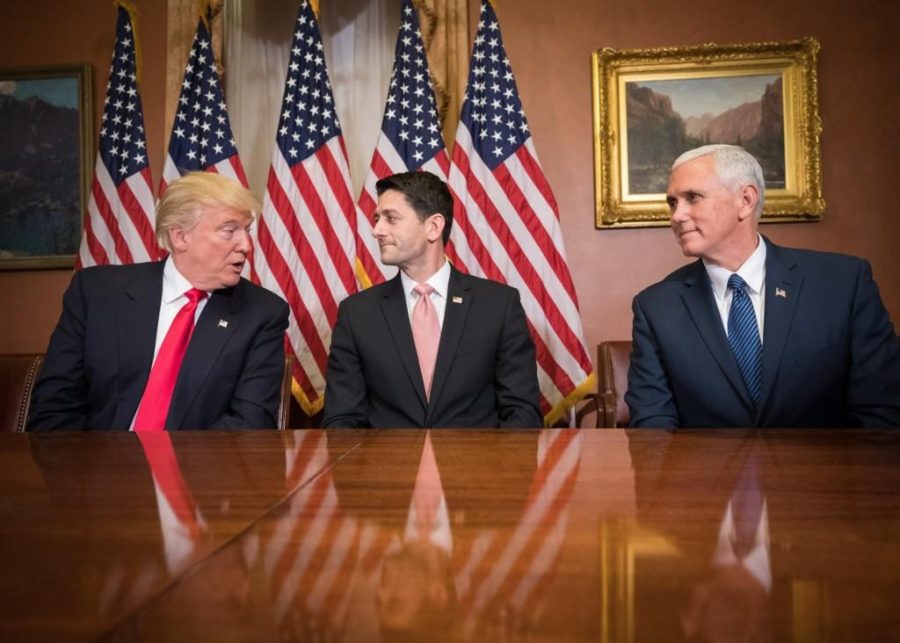‘Trumpcare’ bill withdrawn
Story by Collin Morris, Assistant Sports Editor
Through day 69 of Donald Trump’s presidency, the fate of the American Health Care Act was determined and the Russian controversy continued to unfold.
Alleged coordination between Trump’s 2016 presidential campaign and Russian officials escalated last Monday after FBI Director James Comey announced his department’s investigation into Russia’s role in the 2016 presidential election.
In an address before the U.S. House Intelligence Committee March 20, Comey formally announced the investigation, which he said has been ongoing since July.
“The FBI, as part of our counterintelligence mission, is investigating the Russian government’s efforts to interfere in the 2016 presidential election,” Comey said. “And that includes investigating the nature of any links between individuals associated with the Trump campaign and the Russian government, and whether there was any coordination between the campaign and Russia’s efforts.”
Multiple individuals with relations to Trump’s campaign have revealed their intent to testify before the House Intelligence Committee, including Trump’s former campaign manager, Paul Manafort, who has been accused of accepting monetary gifts from pro-Russia entities, as well as former political adviser to Trump, Roger Stone.
U.S. Rep.Devin Nunes, R-California, chairman of the Intelligence Committee, has also said the committee will hold a closed hearing with Comey and NSA Director Mike Rogers.
Comey also addressed Trump’s wiretapping claims in his appearance, saying he has “no information that supports those tweets.”
One of Trump’s key campaign promises faltered last Friday with the withdrawal of the GOP’s replacement for “Obamacare,” the American Health Care Act.
The bill, which had originally been scheduled to be heard March 21 was pushed to March 24 because Republicans did not yet feel confident in its support within the party.
In the final hours of the bill’s life, Trump made large-scale efforts to sway the vote his way. According to The New York Times, Trump threatened dissenting congressmen with political backlash, telling Rep. Mark Meadows, R-North Carolina, “I’m going to come after you.”
Press Secretary Sean Spicer also alluded to that same backlash.
“We’re going to make sure to remember those who stood by us, and who stood by the word that they gave to their voters,” Spicer said.
Trump also threatened to move the party’s agenda away from health care reform if Republicans chose not to pass the bill Friday. Speaker Paul Ryan, R-Wisconsin solidified Trump’s threats with his comments after the American Health Care Act’s withdrawal.
“[The Affordable Care Act is] going to remain the law of the land until it’s replaced,” Ryan said. “We did not have quite the votes to replace this law. And, so, yeah, we’re going to be living with ‘Obamacare’ for the foreseeable future.”
Following the bill’s failure, Trump defended the administration’s direction.
“I never said ‘Repeal and replace it within 64 days,’” Trump said. “I have a long time.”
However, multiple examples of Trump saying “Obamacare” would be replaced “immediately” have arisen. And on Nov. 1, 2016 in King of Prussia, Pennsylvania, Trump said exactly that just days before his victory.
“When we win on Nov. 8 and elect a Republican Congress, we will be able to immediately repeal and replace ‘Obamacare,’” Trump said.
He then went on to reiterate his claim.
“I will ask Congress to convene a special session so we can repeal and replace,” Trump said. “And it will be such an honor for me, for you and for everybody in this country because ‘Obamacare’ has to be replaced. And we will do it, and we will do it very, very quickly.”
Trump kept a separate campaign promise Friday, giving the federal government’s approval of the Keystone XL pipeline. His decision comes just months after signing an executive order greenlighting the Dakota Access pipeline.
The approval reverses a 2015 decision by then-President Barack Obama, which denied the pipeline. TransCanada, the company behind the project, now awaits approval from the state of Nebraska to complete its construction.
After claiming states such as West Virginia and Kentucky by wide margins, Trump also began taking steps toward fulfilling his pledge to restore coal jobs those states once so desperately relied upon. Trump inked an executive order initiating the withdrawal and rewriting of the Clean Power Plan, an Obama-era Environmental Protections Agency regulation aimed at lowering carbon emissions.



























































































